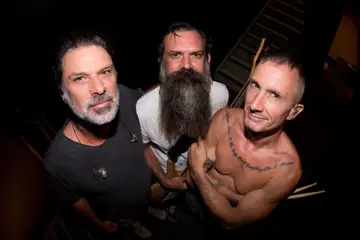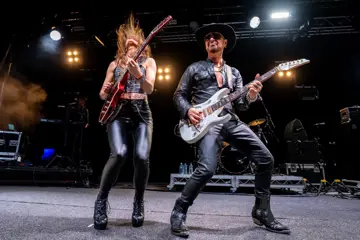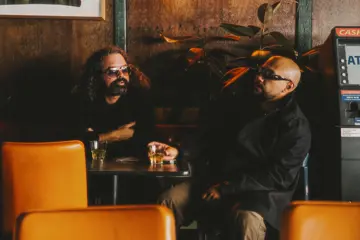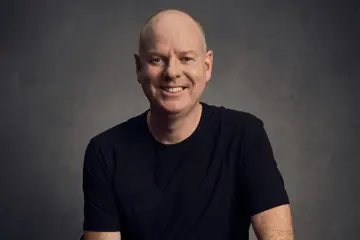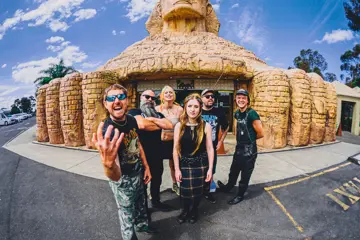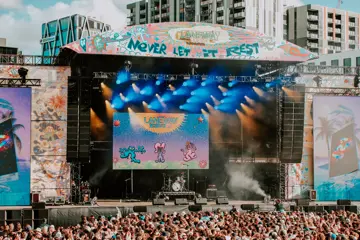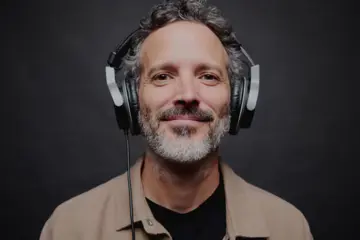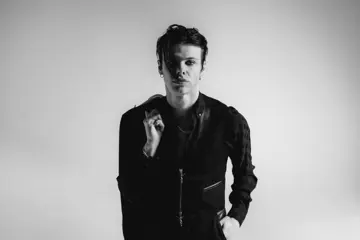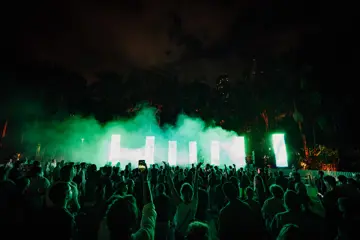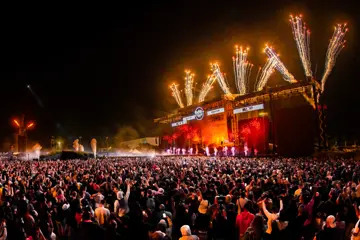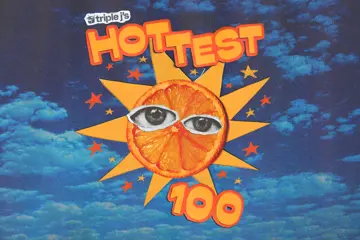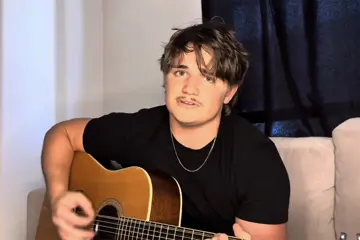This year marks the 10th instalment of the Human Rights Arts & Film Festival, which has grown from a boutique Melburnian concern into a national event. It’s one of the highlights of the local cinematic calendar, HRAFF having long-ago established itself as one of the most-smartly curated festivals in Australia, its program notable not just for its social currency but cinematic quality.
DO NOT RESIST

Craig Atkinson’s documentary opens in Ferguson, Missouri, at the moment a protest becomes a riot: the angry citizens, the overbearing police, the rounds of tear-gas, the tumult, the terror. The film isn’t about the Black Lives Matter movement, but about the militarisation of police in America: the employment of SWAT teams, tanks, and bellicose procedures in pursuit of the most minor criminals. The role of cops, in turn, has gone from serve and protect, to threaten and oppress.
DHEEPAN

In Jacques Audiard’s sterling thriller — winner of the Palme d’Or at Cannes in 2015 — a trio of Tamil refugees pose as a ‘family’ in order to be more sympathetic immigrants. After landing in France, they end up in a crime-riddled housing estate, travelling across the world just to exchange one warzone for another.
FALLEN FLOWERS, THICK LEAVES

In China, attitudes towards female sexuality, and the role of women in society, aren’t changing at the same speed as other cultural institutions. Laetitia Schoofs’ documentary — at once candid and cute — stages an open conversation about things too often left unspoken, its confessions of sexual dissatisfaction and old-fashioned gender expectations suggesting greater cultural collisions between the traditional and the modern.
FIRE AT SEA

Don't miss a beat with our FREE daily newsletter
Gianfranco Rosi’s much-praised documentary is an observationist portrait of life in Lampedusa, the Italian island that, for immigrants heading North from Africa, provides a gateway to the EU. Fire At Sea contrasts the sufferings, and tragedies, of those who arrive by boats with the lives of the locals for whom Lampedusa is no frontier but simply home.
THE FREEDOM TO MARRY

The marriage-equality movement gets its own middlebrow documentary, whose reductive narrative arc turns it into a piece of crowd-pleasing inspirationalism. Here, real life becomes courtroom drama, as director Eddie Rosenstein builds towards the final Supreme Court verdict that will enact a dream into law.
AN INSIGNIFICANT MAN

While it lacks the salacious and ridiculousness of Weiner, those seeking another political documentary boasting unfettered backroom access, intra-party machinations, and on-the-ground reactions to controversial events will get it with Khushboo Ranka and Vinay Shukla’s sterling ‘political thriller’. It charts the rise of populist politician Arvind Kejriwal and his Common Man’s Party. He births it as an attempt to combat India’s entrenched corruption, but can he enter the world of politics and not end up getting dirty?
INTENT TO DESTROY: DEATH, DENIAL & DEPICTION

A documentary accompaniment to the creaky big-budget Armenian-genocide melodrama The Promise, Joe Berlinger’s film, at its lowest points, is merely a promotional ‘making of’. But Intent To Destroy also gets to explore, in depth, the greater themes that The Promise can’t quite: the deep social currents that led to the cataclysmic event, how the Armenian genocide effectively provided a blueprint for the Holocaust, and the complex reasons behind the ongoing, official denial of genocide by Turkey.
THE OPPOSITION

Holly Fifer’s documentary — which chronicles a settlement of locals in Port Moresby fighting land-grabbing efforts by an Australian development concern — found momentary media fame last year when a Supreme Court injunction forced it to be shown in redacted form overseas, and shelved here. The lawsuit against The Opposition came from PNG politician Dame Carol Kidu, who, unsurprisingly, emerges as the turncoat villain in this now-emancipated picture. On opening, Kidu is on the frontlines, standing with the locals in the way of the bulldozers. By the end, she’s the paid-up ‘consultant’ of the developers. “You can’t fight progress,” she intones at the end, that phrase, as ever, used to silence and suppress those without money, in deference to those with.
QUEST

There’s shades of Hoop Dreams in this grand, warm, heartbreaking documentary saga, in which the trials and tribulations of one family — living in a rough-and-tumble hood in north Philadelphia — give rise to a greater portrait of America. There are good times and bad, tragedy and triumph, director Jonathan Olshefski using elections as signposts of the passage of time, and the state of the nation, ending with the grim, ironic sounds of a campaigning Trump proclaiming he’s going to ‘fix’ inner-city, African-American communities.
RADIO KOBANÎ

In a city under siege, a 20-year-old Kurdish girl starts a pirate radio station, sending out a signal of hope for all the freedom fighters beating back the occupation of IS. It’s akin to planting the flag of culture amid the rubble, as the broadcasts — including interviews with survivors, soldiers, poets, musicians — create a sense of community, which goes hand-in-hand with the reclamation, and subsequent rebuilding, of a razed city.
RAVING IRAN

“They love being lied to,” says one of this documentary’s principles, of Iran’s Islamic morality police, the powers-that-be desiring to hear what they want, not the truth. The subjects of Susanne Regina Meures’ film are a pair of Persian deep-house producers, whose entire creative lives — making electronic music, manufacturing CDs, staging desert raves — is an illegal endeavour, played out in shadowy secrecy. Here, the struggle — and rejections — of the DIY musician is recast as battle against bureaucracy and oppression; with emigration to Europe the artist’s only possible liberation.
SALERO

On the photographically astonishing white stretches of Salar de Uyuni, the world’s largest salt flat, locals have spent hundreds of years harvesting the salt. But when the Bolivian government sees these lands as a potential goldmine for lithium extraction, the traditional and the high-tech are set against each other, and change lingers in the air.
THE SETTLERS

A Jewish father, peyas twisted into dreadlocks, stands outside the bus he lives in with his family, in an illegal settlement in a far-flung Palestinian desert. Holding a baby under his arm, he casually boasts of his unrepentant racism, and smirks when talking about how the local mosque just happened to burn down. In portraying the religious zealots who see encroaching settlement as a biblical march to claim promised lands, director Shimon Dotan effectively hands his subjects enough rope to hang themselves. He offsets their proselytising with clear-eyed critiques of the occupation, apartheid, and the dangerous foundational myths of the modern Israeli state.
SONITA

The titular subject of this documentary is a 14-year-old Afghani refugee, living in Tehran, who dreams of becoming a rapper. It’s a pipedream: women aren’t allowed to publicly perform in Iran, and, back home, her family has plans to sell her into an arranged marriage. It’s at this point that filmmaker Rokhsareh Ghaem Maghami enters the frame, becoming an active, interventionist figure in her film, and its subject’s life. The results — enabling dreams, both movie and reality moving towards feel-good inspirationalism — make the old documentary stricture of objective observation seem stodgy, inhumane.
SPEAR

Pure dance films are relatively few and far between, so Stephen Page’s Spear already stands as a cinematic outlier. But in its non-narrative movements, its bodies in motion, the Bangarra Dance Theatre choreographer’s feature filmmaking debut is a distinctive, vivid, individual portrait of Aboriginal cultural identity: its deep history, ties to the land, and conflicted place within the modern metropolis.
STRANGER IN PARADISE

In an incredible opening montage, filmmaker Guido Hendrikx splices old archival newsreels into an essayist montage, in which the history of humanity, the rise of Europe, and northward migration of Africans is told with both astonishing poetry and a sense of glib fatalism. It’s a profound prologue to a piece of meta storytelling told in three acts. Here, actor Valentijn Dhaenans plays Europe embodied, and in a classroom for newly landed immigrants, he schools them — coldly — on the harsh realities of seeking entry into the EU, one man personifying the inhumanity of its immigration policies.
TEMPESTAD

A piece of eerie cine-essay storytelling, Tatiana Huezo’s docu-fiction diptych presents two separate tales narrated by Mexican women, with the artful imagery both illustrating their tales, and deliberately contrasting them. Each touches on human trafficking, but they suggest a greater portrait of a country gripped by an endless civil war, the lives of many — especially women — lost in the constant conflict between cartels and authorities.
WAR BOOK

Holy fuck, it’s Nathan Barley! That’s well jackson. Nicholas Burns, the man who’ll forever be Barley, joins a starry cast — Sophie Okonedo, Ben Chaplin, Kerry Fox, Nathan Stewart-Jarrett — in this BBC drama, a one-room war-of-words in which a host of political workers meet covertly to role-play the procedural machinations of apocalyptic doomsday scenarios. In the blithe one-liners and bitchy rejoinders, there’s shades of Armando Iannucci, of course; but director Tom ‘War & Peace’ Harper is more interested in the emotional weight that comes with imagining the unimaginable.
WHEN THE EARTH SEEMS TO BE LIGHT

In this poetically titled documentary, a crew of Georgian youths kill time and brain cells in Tbilisi: skating, making music, busting balls, getting wasted. It’s teenage rebellion as a kind of sedition, these kids the product of society that offers them little hope or future, only the moral judgments of religious orthodoxy.
THE WHITE KNIGHTS

The ironic title of Joachim Lafosse’s dark drama seems to be mocking the ever-lamentable sub-genre of White Saviour films. Here, Lafosse — last seen making the claustrophobic family-horror chiller Our Children — recruits Vincent Lindon, Louise Bourgoin, and Valérie Donzelli, who’re on the ground in an unnamed African country, out to offer sweet charity. But their NGO is riddled with guilt, hypocrisy, and corruption, The White Knights based on a 2007 incident in which members of the French charity Zoe’s Ark abducted children from Chad, attempting to ‘sell’ them back home as Sudanese war orphans.
The 10th annual Human Rights Arts & Film Festival is on in Melbourne now until 18 May, with further dates in Sydney, Canberra, Perth, Brisbane and Hobart.

